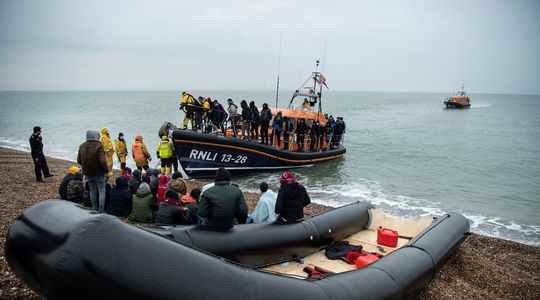Nine months of work to deliver an agreement as astonishing as it is controversial: British Prime Minister Boris Johnson announced that from this Thursday, April 14, Rwanda would welcome all illegal migrants who have arrived in the United Kingdom since January 1, and whatever their nationality. The stated objective is to drastically reduce the number of migrants, while in 2021 nearly 28,500 people arrived in British territory via the Channel, compared to 8,466 the previous year. An increase sounding like a failure for Boris Johnson, who when he came to power in July 2019 pledged to reduce illegal immigration. With the approach of the local elections of May, the Prime Minister wants to strike the spirits.
Why choose Rwanda?
Last January, there were rumors of a possible agreement with Ghana, but the latter quickly denied wanting to participate in this policy. Three months later, Rwanda accepted, and through the voice of its Minister of Foreign Affairs welcomed the future collaboration: “Rwanda is delighted with this partnership with the United Kingdom to welcome asylum seekers and migrants , and to offer them legal ways to live”, he declared, before adding that his country will be able to welcome “tens of thousands of people in the years to come”, and that these will be able “to settle there permanently if they wish”.
In this case, Rwanda will receive an envelope of 144 million euros from London. No expense to be expected, therefore, for a country where more than half of the population lives below the poverty line. And a decision in line with the mindset of President Paul Kagame who, according to Africa specialist Antoine Glaser, wants “to ensure that Africans stay on the continent to develop it”.
Are there similar policies currently at work?
The policy of sending illegal migrants to foreign soils has already been practiced recently, in particular by Australia, with the “Pacific Solution” programs between 2001 and 2007 then “Sovereign Borders” since 2013. They consist of settling migrants on islands in the Pacific, where they live in refugee camps that look a lot like detention centers. In 2016, the Supreme Court of Papua New Guinea ruled the Australian migrant detention center on Manus Island illegal, declaring it contrary to human dignity. Australia promised to dismantle it but not to end its policy.
Why are NGOs offended by this decision?
If Boris Johnson promises that Rwanda is “now one of the safest countries in the world”, the non-respect of the fundamental rights of migrants is what non-governmental organizations fear. According to Amnesty International, in addition to being “scandalously ill-conceived”, the British plan puts faith in a country “with a dismal human rights record”.
Enforced disappearances, arrests of bloggers and journalists, suspicious deaths in prison, the NGO lists on its website the concerns that may arise from the arrival in this country of thousands of people from different cultures: Iraq, Syria, Eritrea. For its part, the Office of the United Nations High Commissioner for Refugees has already announced that if such a law were adopted, it would contradict the Geneva Convention for Refugees.
